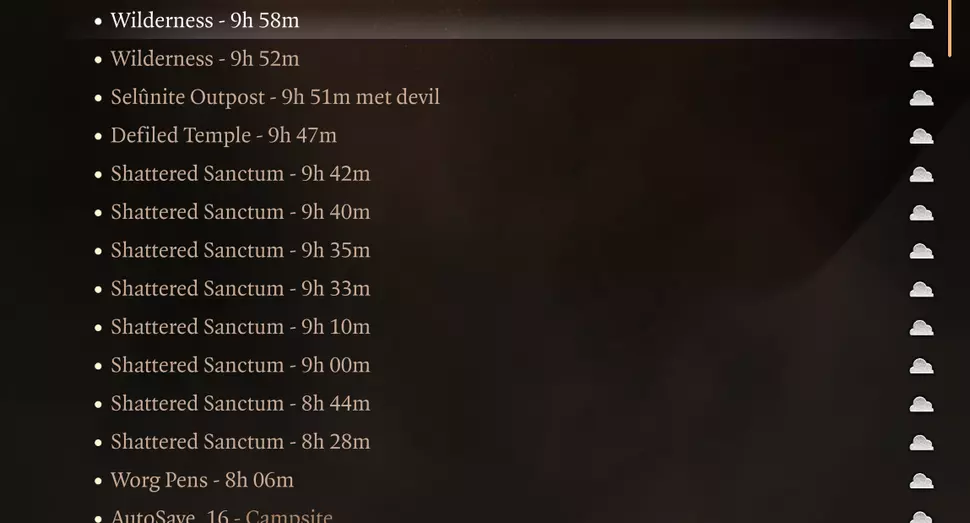
Introduction
In the realm of RPGs, the principle of embracing the consequences of our actions is often extolled as a means to fully immerse ourselves in the narrative. The thrill of uncertainty and the unexpected outcomes of our choices form the essence of role-playing. However, in the case of Baldur’s Gate 3, developed by Larian Studios, the line between accepting consequences and resorting to a controversial practice known as “save scumming” appears to blur. This article delves into the practice of save scumming, its justifications, and the nuanced dynamics it introduces to the gameplay experience.
The Temptation to Save Scum
Baldur’s Gate 3 presents a vast and intricate sandbox for players to explore. It’s not uncommon for adventurers to find themselves facing unexpected bugs, crashes, or unanticipated challenges that can lead to unfavorable outcomes. To counter these uncertainties, many players find solace in frequent saving. However, is this prudence or a step into the territory of save scumming?
The Thin Line: Prudence vs. Save Scumming
Save scumming, in its purest form, involves creating backup saves to circumvent the consequences of risky decisions. Yet, in the context of Baldur’s Gate 3, the intent behind saving after every combat or crucial choice is not necessarily to manipulate outcomes. It serves as a precaution against technical mishaps, allowing players to preserve their progress in the face of unexpected crashes or glitches. The crucial distinction lies in whether the act of reloading is used to explore different narrative branches or merely to reverse unfavorable outcomes.
An Unplanned Path
The journey of a righteous adventurer can swiftly veer off course, leading to a plethora of unintended consequences. A failed persuasion check could escalate into an unforeseen altercation, dramatically altering the course of the narrative. This is where the allure of save scumming emerges – the opportunity to rectify decisions that may not align with the envisioned character arc.
The Weight of Narrative Consistency
Baldur’s Gate 3 aims to capture the essence of a Dungeons & Dragons tabletop campaign. Yet, the delicate balance between gameplay mechanics and storytelling prompts players to ponder the implications of their actions. While some reloads may be driven by a desire to correct errors, others stem from a commitment to maintain narrative coherence. For instance, the decision to reload after a series of unfortunate events may be fueled by a desire to uphold a character’s personality and alignment.
The Art of Experimentation
In a realm devoid of human Dungeon Masters, experimentation becomes the crucible of discovery. The absence of a guiding voice prompts players to tread uncharted waters. While the thrill of embracing consequences is enticing, the option to reload encourages experimentation without fear of irreversible missteps. This raises the question – is it acceptable to save scum when the alternative is cautious stagnation?
Larian’s Take: Freedom and Consequences
Larian Studios, the masterminds behind Baldur’s Gate 3, recognize the inherent tension between embracing consequences and succumbing to the allure of reloading. The game’s mechanics encourage experimentation through quicksaving and reloading, emphasizing that there are no inherently wrong choices, only a tapestry of outcomes. Trusting the dice and allowing the story to unfurl organically is heralded as a core tenet, but the studio acknowledges the player’s autonomy to shape their journey.
Conclusion
In the complex realm of Baldur’s Gate 3, the debate surrounding save scumming intertwines with the very essence of role-playing. The allure of pristine narratives clashes with the unpredictability of gameplay. While purists argue for unflinching acceptance of outcomes, the art of save scumming offers a lifeline for those who seek narrative consistency and unexplored possibilities. Ultimately, the choice to reload or abide by the whims of fate rests in the hands of the player.
FAQs about Baldur’s Gate 3
1. What is save scumming in Baldur’s Gate 3? Save scumming refers to the practice of frequently saving and reloading in the game to reverse or alter outcomes, often to maintain narrative coherence or explore different choices.
2. Is save scumming considered cheating? The perception of save scumming as cheating varies among players. Some see it as a valid tool for storytelling, while others view it as undermining the essence of consequences in RPGs.
3. Can save scumming enhance the gameplay experience? Save scumming can offer a unique perspective by allowing players to experiment without fear of permanent consequences, potentially enriching the overall gameplay experience.
4. How does Baldur’s Gate 3 balance freedom and consequences? Baldur’s Gate 3 encourages players to trust the dice and embrace the consequences of their actions, while also providing the option to reload and explore alternative paths.
5. What makes RPGs engaging? RPGs thrive on player agency, immersion, and the dynamic interplay between choices and outcomes, contributing to a captivating and interactive storytelling experience.




